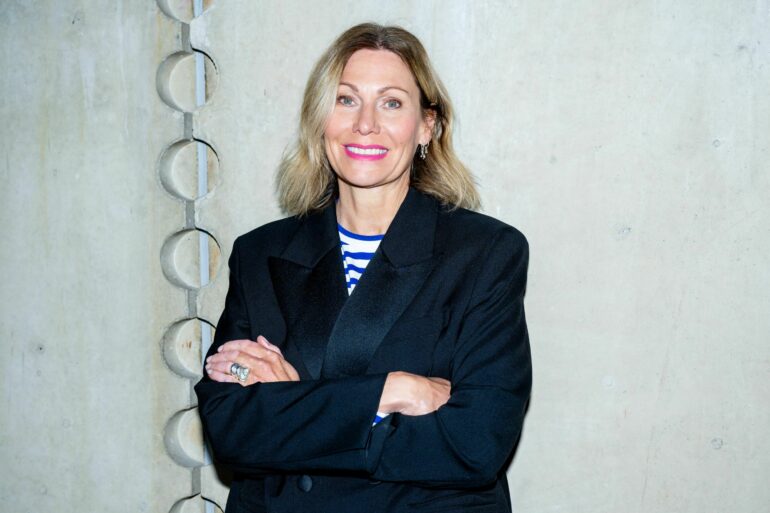Written by: Jan Lumholdt
08.05.25
One year into the job and in light of the recent national film inquiry, the new CEO of the Swedish Film Institute discusses visions, missions, concerns, ruckus, unrest, and putting her all into getting Swedish film back on track.
“This is not a day for any greater enthusiasm, but I’ll do my best” was your very unminced opening remark at the 2025 Film Institute spring preview in January. Financial crisis and getting back on track were your main talking points, while the more preferred script of optimistic observations and statistics was all but dismissed.
Anna Croneman: Well, yes… There’s been some unrest over my at times rather straight ways of addressing things. But to me, that’s the very point of my assignment – no sugarcoating. And I’m seriously concerned about the state of Swedish film. To stand there on stage, presenting a season with a total of three Swedish fiction features, is just not very reassuring. That being said, I do see things happening, project-wise, both in the near future and a little further onward. And if the film inquiry turns into concrete politics, I sincerely hope that we’ll be able to match it with according content.
In early March, the very much talked about and highly anticipated film inquiry was presented to the Minister of Culture. The key proposals are a lowering of the cinema VAT from 25 to 6 per cent, a 10 per cent fee from the ticket revenues, the introduction of a fee from the international streaming services based on their revenue in Sweden, consisting of 1.5 per cent, and the creation of a new film fund in order to bring capital into the industry, a fund that will provide SEK 300 m. What are your feelings about this proposal?
AC: I like this very much. The inquiry has been scrupulously executed, and addresses the very reality of the challenges our industry faces. I also like the fact that it lets the Swedish film industry at least stand independent of governmental involvement, something this fund will enable. I also find a few challenging aspects, not least how this fund is supposed to be managed. There’s talk of establishing a council consisting of financiers, which to me feels like a conflict of interests – cinema owners and streamers will no doubt have very specific preferences on how the money is divided. The streamers will want as much as possible put into the production incentive part, which in turn will not sit well with the cinema owners. We also have statutes for the foundation which do not fully comply with the suggested “council”.
A 1.5 per cent streaming fee seems quite modest in comparison with some other countries. We’re taking baby steps here, by the looks of things.
AC: Norway and Finland are currently underway to realising their procedures here. Exact rates are yet to be announced, but Sweden would be the last one to the table. Denmark’s fee is between 2 and 5 per cent, depending on if you invest in local production, in which case you’ll get the lower rate. In Sweden, if you invest more than 10 per cent locally, you’ll be exempted from the fee – not least Netflix falls into this category.
As for the cash rebate incentive, the report recommends that the administration be moved from the Agency for Economic Growth to the Swedish Film Institute. Another challenge?
AC: I know that the Swedish Film & TV Producers Association, which has fought hard to get this in place, probably isn’t that happy about the idea of the Film Institute being in charge here. They are afraid this will fortify the incentive as a cultural support rather than an industry support. As the existing funding comes from culture, we cannot really see where the incentive is being administrated makes any difference.
Then if the recommendation of the inquiry to give priority to the projects with the highest budgets/spend is put into effect, it will be television series rather than film that get the chief portion. For this proposition to have any effect for features and documentaries, money needs to be dedicated to film.
Of course we all wish that the support figure – for the incentive - would have been the originally proposed 300 million rather than 100 million, which is the figure today.
Do you have any indication of when this proposal can be turned into reality?
AC: Or at least parts of it… There are assessments out there from those better informed which say that it depends on how these proposals are received, and if they’re well received, the sitting government will have to act here and now, as we have the next election in 2026. In that case, I doubt that all the proposals will be immediately realised, and least of all the streaming fee implementation, which also is a proper bill, with the regular procedure that is required.
Looking at our Nordic neighbours, we share similarities in our film politics, but also some distinct differences. According to the inquiry, the 2024 amount per capita, in SEK, that is invested in support for domestic and international productions in Norway is 104, in Denmark: 75, in Finland: 63, in Iceland, due to its size and a very favourable production incentive, 812. And then, Sweden: 36. Will the new Swedish fund raise this figure?
AC: Absolutely, even with the exact amount yet to be confirmed. Still, since those numbers were presented, Denmark has got even more through their newly-instated production incentive and “cultural fee revenue”. Finland has a really respectable market share of 45 per cent in the cinemas these last two years, with some real box office hits. Iceland is vital, both in film and TV. Norway has moved the focus around a bit through recent years. At one point they didn’t differ between cinemas or streaming services, but this has changed, and today they have a very clear focus on the cinema screens. The Danes, who probably have one of, if not the best financed film politics, can support both film and TV through their system, something Sweden is not able to afford – which I would very much like to change.
What are the best Swedish traits in this industry, you’d say? Even on “a day without any greater enthusiasm”?
AC: I’d say that even in recent times, when film has been just out of focus, and we’ve somewhat failed domestically, we have managed to get out there internationally, winning the Cannes Golden Palm and other accolades with our fare. Even this year, we’re going to Cannes next week with a fantastic Tarik Saleh film in the main competition and several other titles with significant Swedish involvement playing in the programme. I’d also add that 2026 looks better than 2025, with a number of very promising premieres. The film commissioners at the Institute look happier by the day, I’ve noticed. They’ve honoured their commitment of finding good projects, to be sure.
You’ve now completed your first year as CEO. Any thoughts?
AC: Well, I consider myself a rather stable person, but it’s been a bit bumpy. I had to start by letting 20 people at the Institute go, in light of the economic realities. Not easy. Then there was some ruckus around the the annual Guldbagge awards which received over a hundred complaints to the Swedish Brodcasting Committee, and then at the Göteborg Film Festival where the Minister of Culture scolded the film industry in her opening speech, all of which got politically charged and turbulent. It also fell on me to kind of be able to provide some answers that I didn’t have, other than that with Guldbaggen there’s always some turbulence going on every year when a new cultural budget is presented, regardless of political camp. That’s something we just have to live with. But far from everyone was in agreement. Then the inquiry was presented, and around the same time, the Film Institute presented a revision of the support system when it comes to language; due to the strained financial situation, we have to limit the number of films we support that are not in Swedish or in a Swedish context. This is the core issue. That too led to an infected debate, and we were called crypto nationalists and the like. I cannot stress enough how valuable international productions are, and we have cultivated some amazing creators taking this route. But if too many of those talents decide to make a film the same year, there’s just no money left for Swedish actors and film workers on domestic soil, which cultural-politically would be very hard to justify.
And just think of it, when I came to this job, I said that “no one really talks about the Film Institute, do they?” These are words I’ve had to eat since then, more than once…
Some enthusiasm can be detected, despite all. How many years do you have left in you in this function?
AC: I’d like to be around long enough in order to see to it that there’s a decent and healthy climate for those who want to make film in Sweden. So I’m putting my all into this, that is the mission. And I still have some fighting spirit left in me, for five… Let’s say seven years. At least.

